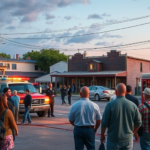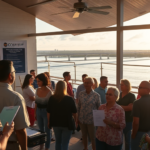McAllen Reacts to Federal Funding Freeze Amid Migrant Shelter Aid Review
A recent federal funding freeze aimed at reviewing the application of migrant shelter aid has left the city of McAllen and its neighbors in the Rio Grande Valley (RGV) grappling with uncertainties regarding future aid and support. As the Federal Emergency Management Agency (FEMA) pauses its Shelter and Services Program, the ripple effects are already being felt across local communities, highlighting ongoing challenges even amid a temporary lull in migrant arrivals.
Program and Aid Under Scrutiny
FEMA’s temporary halt in funding stems from a broader federal review under the Department of Homeland Security (DHS), which is evaluating whether the grants intended to assist with migration surges were misused. The federal government’s scrutiny reflects concerns about possible illegal activities linked to funds allocated during former President Biden’s tenure.
Recipients of these grants, including McAllen and Brownsville, were issued letters requesting comprehensive records of services provided to migrants. These cities are mandated to submit specific data, including migrant names and contact information, within a month. For McAllen, which received over $11 million in aid, the pressure to justify past expenditures coincides with a government agenda to ensure responsible taxpayer fund utilization.
Local Authorities Respond
In McAllen, local officials maintain their administration’s adherence to federal guidelines. Mayor Javier Villalobos has expressed confidence in their processes, emphasizing that assistance provided was closely aligned with federal protocols. “I have no problem signing an affidavit saying we didn’t do anything bad, because we didn’t,” Villalobos stated. “Border Patrol was bringing immigrants to us, to Catholic Charities. They were processed and delivered.”
The Mayor’s office clarified that current low migration levels somewhat mitigate immediate concerns tied to the funding freeze. However, Villalobos asserted that any future increase in migrant arrivals would necessitate renewed financial support. “Should it happen again, and Border Patrol starts picking up individuals and bringing them to the city of McAllen, then once again I would ask, ‘hey you need to help us. If you want us to help you, you have to help us financially,'” he said.
Community and Economic Implications
The potential long-term impact of the DHS review on the RGV’s economic and social landscape is significant. While the pause in funding may seem negligible with current low migrant numbers, any shifts in migratory patterns could present challenges, especially given the Valley’s historical engagement with immigration issues.
Local community members, concerned about how these financial constraints could affect essential services, are keeping a close eye on developments. Maria Torres, a resident and community advocate, cautioned about restricting funds meant to support vulnerable groups, highlighting potential ramifications of such decisions on established humanitarian efforts. “We’ve always been a community ready to help those in need. Freezing these funds can jeopardize critical support we offer,” she noted.
Moreover, apart from migrant aid, there are additional challenges emerging, including the potential rollback of federal support in allied areas. For instance, the recent cessation of a USDA program providing aid to food banks further complicates food security for Valley residents reliant on such resources. Furthermore, local organizations like The Salvation Army in McAllen continue their call for donations to bolster assistance programs for families at risk of eviction, showcasing the broader spectrum of ongoing community needs.
Informing and Engaging Valley Residents
Communication between government authorities and the Valley’s community remains pivotal. Transparency in sharing information on the federal review will allow both residents and local officials to adapt as necessary. Community meetings and forums will likely become avenues where members can express opinions and share insights on navigating such policy shifts.
For individuals interested in more information or wanting to contribute to local initiatives, resources such as The Salvation Army remain vital touchpoints. Their ongoing efforts to provide daily meals and support eviction-prevention programs underscore enduring community resilience, even under scrutiny.
Looking Forward
The federal review’s outcomes and subsequent policy adaptations will undoubtedly impact McAllen and the wider Valley in the months to come. The focus on ensuring that funds are utilized responsibly reflects national trends emphasizing accountability but must consider the unique pressures faced by border communities like those of the RGV.
As the situation unfolds, stakeholders’ voices – municipal leaders, community advocates, and residents alike – will be critical in shaping a sustainable vision not just for migration-related challenges but for the full spectrum of economic and social initiatives aimed at benefiting Valley residents. By fostering dialogue and collaboration, McAllen continues to highlight the importance of community interest in weathering federal policy changes while remaining committed to its core values of support and aid.







